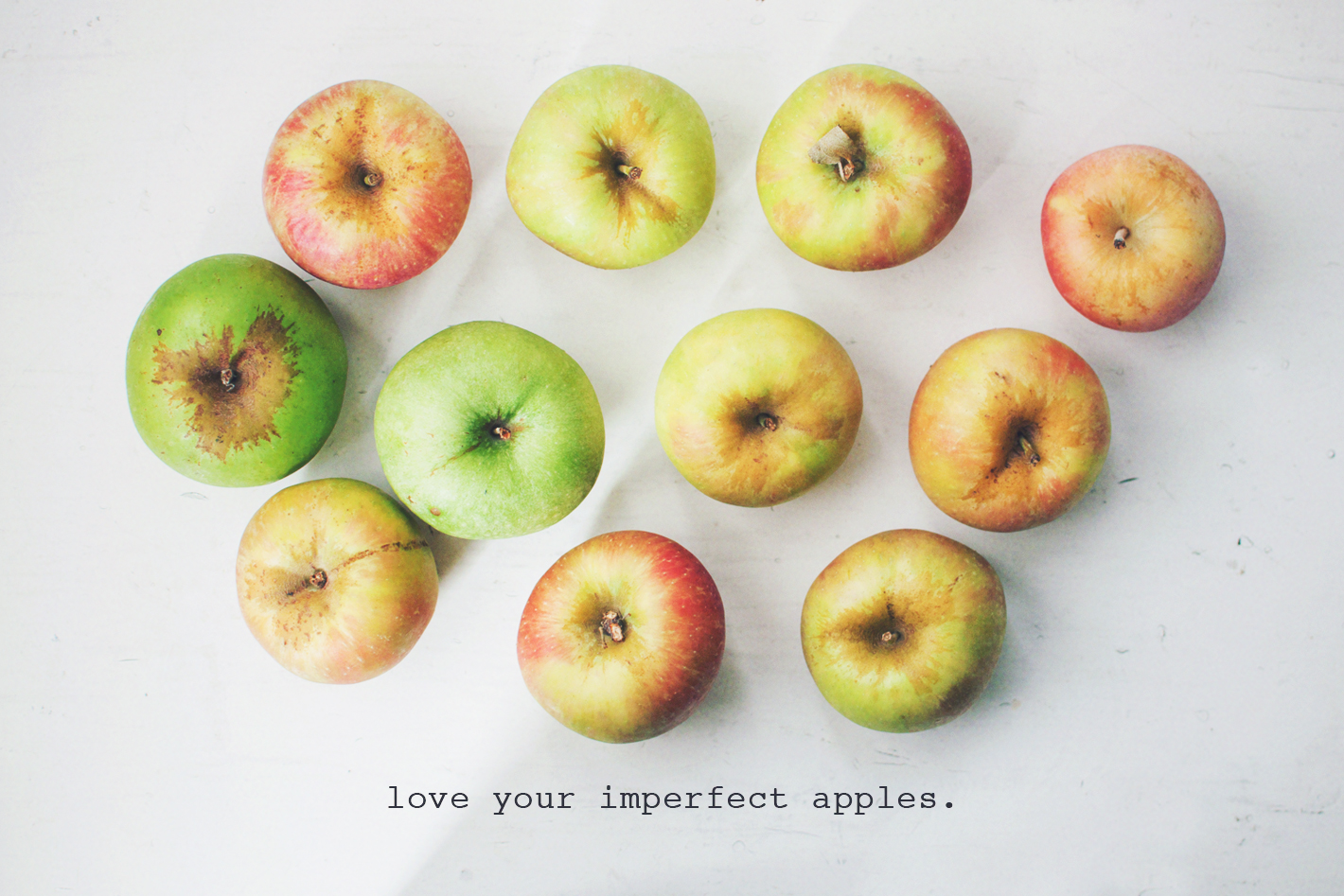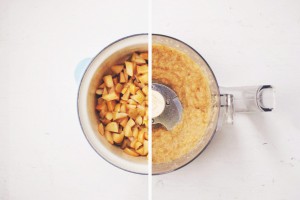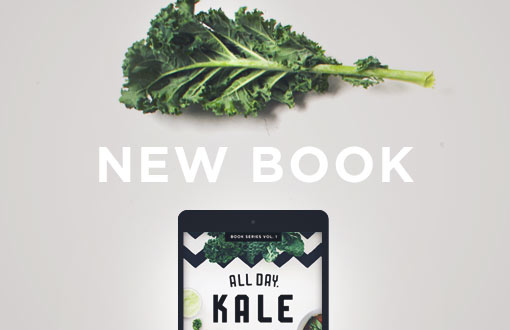
Apples are an AMAZING healthy food to add to your weekly grocery cart, but what to choose? Organic apples or the conventional kind? And does it really matter?
Fresh matters first.
First off, eating a FRESH apple (organic or not) is a fantabulous choice when your only other options are highly processed JUNK food. The fiber and natural vitamins in an apple will go much further than a bag of chips or those darn free cookies in the office. So if what you’ve got is a regular ol’ apple when you’re hungry, eat it and enjoy!
Next, choose less pesticides.
Did you know that apples are one of the most highly contaminated crops when it comes to pesticides?
Now while we don’t preach that everything you eat has to be organic (especially when you are on a budget), we do feel strongly that some foods should most definitely be consumed organic if you can help it. According to the Environmental Working Group, apples are at the very top of the Dirty Dozen list for being a highly contaminated crop, right next to celery and tomatoes, and of course our favorite leafy greens.
How do pesticides work on apple orchards?
Apples are highly contaminated because of the pesticide spraying process. Tractors are driven directly next to the apple trees with a mechanical spraying device that shoots out large even spurts of pesticide to coat the leaves AND the exterior of the fruit. This pesticide adheres to the skin and even seeps into the core because the concave shape near the stem creates a perfect bowl-shaped vessel.

8 reasons why to choose organic apples
-
Pesticides are toxic. The sole purpose of any pesticide is to kill living organisms. According to the EWG, the U.S. government and international government groups have proven data that shows a direct link to pesticides and: “brain and nervous system toxicity, cancer, hormone disruption, skin/eye/lung irritation, and even ADHD.”
-
Spraying pesticides is harmful to the farm workers. We don’t often think of the work environment of those that pick our food, but it is something to consider. Forbes magazine published an article last year that said: according to the National Institute for Occupational Safety and Health (NIOSH),
“…pesticide-related illness is an important cause of acute morbidity among migrant farm workers in California. A few categories (organophosphates and carbamates, inorganic compounds, and pyrethroids) account for over half of the cases of acute illness….Growers should be educated about alternative forms of pest control and incentives should be provided to encourage their use.”
-
Organic apples taste better. There is an unbelievable taste difference between organic apples and conventionally-raised apples. This is heavily due to how and when the fruit is harvested during their lifecycle.
-
Even organic apples are affordable in-season. If you haven’t noticed, fruit is EXPENSIVE and apples (even the organic kind) are by-the-pound, one of the most affordable fruits available during it’s prime season (Fall/Winter).
-
It’s a healthy, high-fiber, low-sugar fruit. In comparison to many other fruits, apples (especially green and tart versions) are naturally low-in-sugar and high in fiber, which keeps you fuller, longer without the sugar crash.
-
Apples are great for cooking and baking. A handful of apples diced into a green salad, or a thin slice of apple on an open face sandwich or even adding applesauce to muffins, cakes, or quick bread recipes add tons of moisture, without a ton of calories.
Enjoy this HOMEMADE Applesauce
Old Fashioned Apple Cake (gluten-free and dairy-free)
Kale. All Day. Err Day.










Say, I am trying to decide what to do about a windfall of apples. I was going to dehydrate them to chips, but found out they are not organic and am wondering if there is any way to get rid of the toxins and still use them. We live frugally so I am reluctant to throw away possible good food. We spend no money on junk food. Neighbors have given me apples that are organic (i close my eyes…yes, some are wormy,) and I use those adding cinnamon and ginger to the lemon water I pass the slices through. Yum.
A friend says to throw them because she got sick in an appleorchard that was sprayed, but she also urged me to check out the internet and I found you first. Maybe a vinegar water wash? But that doesn’t take care of the inside poison. Maybe peel and core them? Should I try to find out what kinds of pesticides were used? Btw, I am really busy too; we just moved, I am an artist, homeschooling, have a fascination with a class I recently took on glycobiology- sciences are wonderful- , and love people and spending time with them. I really do not have time to do apples if they are going to do more harm than good.
Thnak you.
Hi Martha — You have me stumped on this one. With so many people hungry in this world, it is hard to throw food away. I just watched this amazing documentary about 4 college students traveling to South America to live on $1 a day for 2 months to experience life like BILLIONS of people that have very little. Hmmm. At the same time, if you are in a position of reducing the amount of chemicals/toxins that go in your body because there are clear, cold facts that show they are harmful, what do you do?
Peeling them and coring them and even cutting off the top 1/3 could help. The concave shape where the stem inserts into the apple should be removed because that is where pesticides can sit when sprayed (it’s a perfect bowl vessel).
Another option is to use many of them for non-edible art crafts. I’ve seen some pretty cute examples of using apples as stamps, or even vessels for floating votive candles. You can print on fabric or paper and use that printed fabric or paper to make placemats, decorations, aprons, and tons more. Heck, you can even carve out different shapes (like potato stamps) and make different designs. Here are some examples:
http://www.thecraftycrow.net/2013/09/10-favorite-apple-crafts.html
http://www.marthastewart.com/274692/apple-crafts
http://www.sheknows.com/videos/Jpb2d3ODoWOarTHoj-GnLLVOAKSefQBW
Enjoy!
Wow! Thanks so much for the info. I was JUST having this conversation with a coworker about not knowing when to buy organic, and how much more expensive it is. Thanks again!
Hi Kristy — thanks so much for sharing your story about your convo with your coworker. When we got word about how pesticides impact our favorite apples, we had to share. Makes perfect sense how that little, concave shaped area near the stem would be a perfect “bowl” to capture the pesticides. Hmmm. Makes you think twice huh?
Hi Andrew,
Thanks so much for sharing! This is so helpful and great to hear. Do you produce a supply for large chains or small markets? Do you know if it’s like this for large, industrial apple farms?
We are ALWAYS open to hearing and learning more, so feel free to share.
Much much appreciated!
Ugh! I love apples, and grew up eating from uncultivated “wild” trees and from local orchards. Most commercial varieties are bland and mushy now, but I love Fujis. So I thought organic Fuji apples were gonna be a real treat. Wrong! The ones I got this week are soft and almost mealy, more like a Gala/Delicious cross, with little juice and less flavour. The skins are thick and have a moldy taste. Going back to regular grocery store apples!